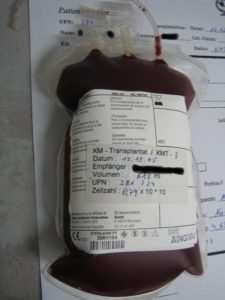“In newly diagnosed myeloma patients, upfront autologous transplant (ASCT) prolongs progression-free survival 1 (PFS1) compared with chemotherapy plus lenalidomide (CC+R)…”

Hi David- Your story is very encouraging regardless of all your trials. I was diagnosed Oct 2nd 2019. Had my autologous stem cell transplant (ASCT) April 2020. Was a wreck from the melphalan and high dose chemo. I am classified as in very good partial remission (VGPR).
My doc says she won’t know if in complete remission without a bone marrow biopsy (BMB). My blood work is good.
This cancer has changed my life.
I am also a type 1 diabetic for much of my life. Quite the juggling act with dexamethasone aka a glucocorticoid drug.
In your research have you found the average life span after being diagnosed with MM is still 5 yrs. I am 63 but a very young 63. I hate that living over my head… LJ
Hi LJ-
I am sorry to read of your MM diagnosis. It sounds as though you are doing okay after a tough time since your diagnosis.
To answer your question, the main benefit of an ASCT, according to studies and the study linked below, is a longer progression-free survival. Your first remission should be longer, on average.
I admit that I worry that conventional oncologists over-treat MM at the expense of other health issues. Diabetes type 1 in your case. Further, if your diabetes has caused kidney damage at all, I also worry about the effect that both MM may have on your kidney function as well as all of the toxicity may have on your kidneys that comes from an ASCT.
It is important to note that lots of MM survivors live long lives without ever achieving complete remission. A VGPR, according to research, leads to just as long an OS (overall survival) as CR (complete remission).
You mention that your blood work is good. How about your kidney diagnostic information aka
- your creatinine
- your BUN and
- your eGFR
My point, LJ, is that I think your oncologist should focus on any/all health challenges (blood, marrow, kidney, heart, bone, etc.) and not just your MM.
Are you experiencing any side effects such as peripheral neuropathy aka nerve damage? Any bone pain?
Let me know, thanks.
David Emerson
- MM Survivor
- MM Cancer Coach
- Director PeopleBeatingCancer
Recommended Reading:
“The treatment of multiple myeloma and diabetes mellitus is multifaceted. The coexistence of the two conditions in a patient forms a major challenge for physicians…
It is estimated that around 8–18% of cancer patients have diabetes. Diabetes and cancer are two overwhelming conditions for both patients and clinicians. The treatment of diabetes in the presence of cancer is a major challenge for physicians. Maintaining adequate glucose control is a crucial factor in preventing infections in at-risk cancer patients…
There have been outstanding improvements over the past decade in the area of initial therapy of newly diagnosed multiple myeloma. Several large trials investigated the role of treatment regimens involving one or more of the most recent medications. [10–18]. Many factors govern the choice of initial therapy for MM. The patient’s age, performance status, eligibility for stem cell therapy, and most importantly the presence of disease-related complications as well as other comorbid conditions such as diabetes and obesity are factors to consider before the choice of initial therapy…
Dexamethasone was shown to be more harmful to the diabetes profile in a study by Facon et al. where the investigators compared dexamethasone and Prednisone-based regimens with standard melphalan prednisone in newly diagnosed MM patients ineligible for high-dose therapy. The morbidity associated with dexamethasone-based regimens was significantly higher than with melphalan prednisone including severe diabetes [21]. We suggest that patients should be screened for diabetes before starting glucocorticoid treatment and monitored closely. Glucocorticoid-free regimens can be used in patients with diabetes mellitus [22]…
Multiple Myeloma and Nephropathy
Renal insufficiency is a common complication in patients with diabetes. It is also a common accompaniment of multiple myeloma. The presence of such complication in multiple myeloma patients along with diabetes creates an extra burden to the patient as well as the physician. It was reported that nephropathy is a poor prognostic indicator for survival in these two comorbid conditions [
41]…
Multiple Myeloma and Cardiovascular Diseases
Diabetes is well known to be associated with increased risk of coronary heart disease and stroke [
49]. Multiple myeloma can also possibly predispose to these 2 macrovascular complications. The presence of these conditions simultaneously worsens the prognosis and creates a bigger challenge to the treating physician…
“In newly diagnosed myeloma patients, upfront autologous transplant (ASCT) prolongs progression-free survival 1 (PFS1) compared with chemotherapy plus lenalidomide (CC+R)…”




